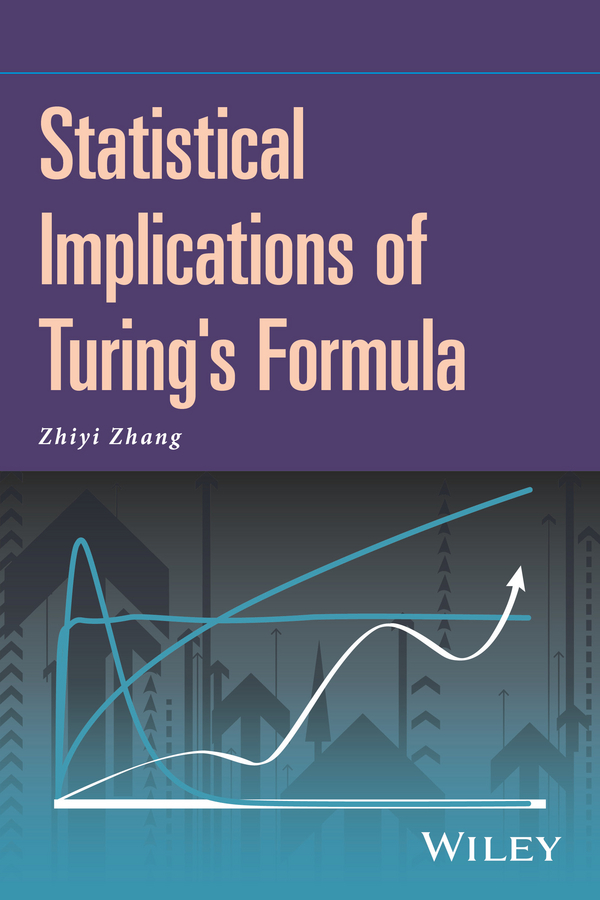Электронная книга: Zhiyi Zhang «Statistical Implications of Turing's Formula»

|
Features a broad introduction to recent research on Turing’s formula and presents modern applications in statistics, probability, information theory, and other areas of modern data science Turing's formula is, perhaps, the only known method for estimating the underlying distributional characteristics beyond the range of observed data without making any parametric or semiparametric assumptions. This book presents a clear introduction to Turing’s formula and its connections to statistics. Topics with relevance to a variety of different fields of study are included such as information theory; statistics; probability; computer science inclusive of artificial intelligence and machine learning; big data; biology; ecology; and genetics. Theauthor provides examinations of many core statistical issues within modern data science from Turing's perspective. A systematic approach to long-standing problems such as entropy and mutual information estimation, diversity index estimation, domains of attraction on general alphabets, and tail probability estimation is presented in light of the most up-to-date understanding of Turing's formula. Featuring numerous exercises and examples throughout, the author provides a summary of the known properties of Turing's formula and explains how and when it works well; discusses the approach derived from Turing's formula in order to estimate a variety of quantities, all of which mainly come from information theory, but are also important for machine learning and for ecological applications; and uses Turing's formula to estimate certain heavy-tailed distributions. In summary, this book:• Features a unified and broad presentation of Turing’s formula, including its connections to statistics, probability, information theory, and other areas of modern data science • Provides a presentation on the statistical estimation of information theoretic quantities • Demonstrates the estimation problems of several statistical functions from Turing's perspective such as Simpson's indices, Shannon's entropy, general diversity indices, mutual information, and Kullback–Leibler divergence • Includes numerous exercises and examples throughout with a fundamental perspective on the key results of Turing’s formula Statistical Implications of Turing's Formula is an ideal reference for researchers and practitioners who need a review of the many critical statistical issues of modern data science. This book is also an appropriate learning resource for biologists, ecologists, and geneticists who are involved with the concept of diversity and its estimation and can be used as a textbook for graduate courses in mathematics, probability, statistics, computer science, artificial intelligence, machine learning, big data, and information theory. Zhiyi Zhang, PhD, is Professor of Mathematics and Statistics at The University of North Carolina at Charlotte. He is an active consultant in both industry and government on a wide range of statistical issues, and his current research interests include Turing's formula and its statistical implications; probability and statistics on countable alphabets; nonparametric estimation of entropy and mutual information; tail probability and biodiversity indices; and applications involving extracting statistical information from low-frequency data space. He earned his PhD in Statistics from Rutgers University. Издательство: "John Wiley&Sons Limited"
ISBN: 9781119237075 электронная книга Купить за 9652.07 руб и скачать на Litres |
Другие книги схожей тематики:
| Автор | Книга | Описание | Год | Цена | Тип книги |
|---|
См. также в других словарях:
Occam's razor — For the aerial theatre company, see Ockham s Razor Theatre Company. It is possible to describe the other planets in the solar system as revolving around the Earth, but that explanation is unnecessarily complex compared to the modern consensus… … Wikipedia
mathematics — /math euh mat iks/, n. 1. (used with a sing. v.) the systematic treatment of magnitude, relationships between figures and forms, and relations between quantities expressed symbolically. 2. (used with a sing. or pl. v.) mathematical procedures,… … Universalium
Many-worlds interpretation — The quantum mechanical Schrödinger s cat paradox according to the many worlds interpretation. In this interpretation every event is a branch point; the cat is both alive and dead, even before the box is opened, but the alive and dead cats are in… … Wikipedia
Inquiry — For other uses, see Public inquiry and Enquiry character. An inquiry is any process that has the aim of augmenting knowledge, resolving doubt, or solving a problem. A theory of inquiry is an account of the various types of inquiry and a treatment … Wikipedia
Aristotle — For other uses, see Aristotle (disambiguation). Ἀριστοτέλης, Aristotélēs Marble bust of Aristotle. Roman copy after a Gree … Wikipedia
Empiricism — John Locke, a leading philosopher of British empiricism This article is about the field of philosophy. For the album by Borknagar, see Empiricism (album). Empiricism is a theory of knowledge that asserts that knowledge comes only or primarily via … Wikipedia
